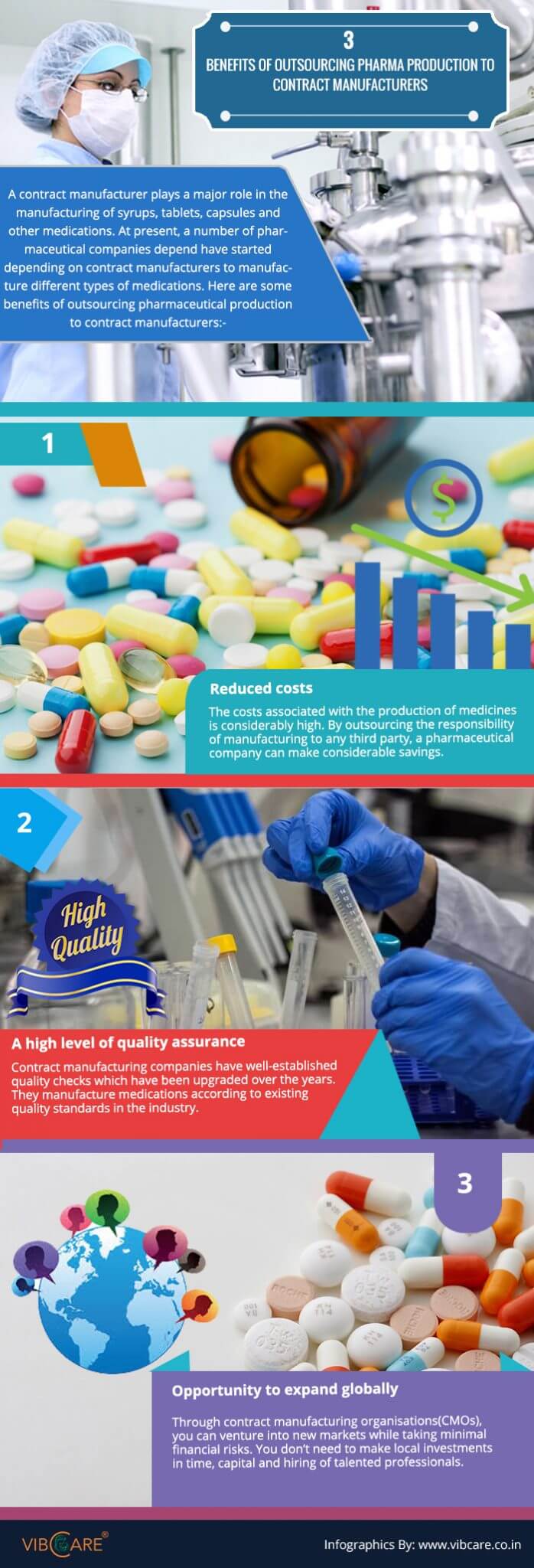Benefits of Pharmaceutical Contract Manufacturing
Image source: https://vibcare.co.in/third-party-contract-manufacturing/
Pharmaceutical contract manufacturing is the process of outsourcing the work of manufacturing medication such as pills, tablets, and capsules for consumption to a third party. It may also entail drug development processes and even regulatory support to help with the lengthy approval needed for a drug to be released on the market.
Pharmaceutical contract manufacturers give support for the manufacture and design of pharmaceuticals. These contract manufacturers normally provide quality backed and extremely secure pharmaceuticals at affordable prices. Most of the contract manufacturers help their customers in the production, finance, marketing, distribution and program management of pharmaceuticals. Many pharmaceutical companies seek the help of contract manufacturers to produce a product economically and within a certain period of approved time frame. Contract manufacturers usually work together with these pharmaceutical companies to produce the best products.
The main pharmaceutical contract manufacturing capabilities include solid dose tablets, capsules, and oral liquid production. Clinical supplies manufacturing, process development, stability testing programs, analytical method development and validation, technical transfer, process scale-up and validation, unit dose blister packaging with barcoding and regulatory consultation are the other functions of pharmaceuticals contract manufacturing. Many pharmaceuticals contract manufacturers deal with the manufacturing and development of sterile liquids and lyophilized products in solid, semisolid and liquid dosage forms. A few contract manufacturers also assist with formulation and development, secondary packaging, production scale-up, primary and secondary production, and regulatory consultation.
Pharmaceuticals contract manufacturing lessens the time and cost of production thus they provide a service extending capacity for pharmaceutical and biotechnology companies. Pharmaceuticals contract manufacturing is the high quality and economical alternative to small and medium-sized biotech and diagnostic companies. Contract manufacturers usually serve as partners for the smaller and virtual organizations to provide services that require too much time and substantial financial resources. The larger pharmaceutical companies can also reduce their cost of production by outsourcing to contract manufacturers who have more experience and resources.
How To Find A Pharmaceutical Contract Manufacturing Laboratory?
Visiting tradeshow conferences that occur all throughout the year are the best way to find a pharmaceutical contract manufacturing laboratory because most of the ones that are equipped to handle your projects will be in attendance as well.
A tradeshow consists of hundreds of booths, some 10x10, some 20x20, and some are even bigger than that. Each pharmaceutical contract manufacturing company will likely have a sales representative present along with a number of scientists that are readily available to answer any questions you may have about their company and about the services they can provide to your specific projects. There are at least 10 or more big tradeshows per year that are held across the world that you should plan to attend, depending on the type of pharmaceuticals you're interested in manufacturing, whether it be biopharmaceuticals, pharmaceuticals or nutraceuticals.
Conclusion
Contract manufacturing requires clear deliverables to keep the project focused and to manage it efficiently. Pharmaceutical contract manufacturers need to communicate with their clients when technical issues occur immediately. Since the main feature of pharmaceutical contract manufacturing is the quality of products, contract manufacturers must know all the needs of the customer.

